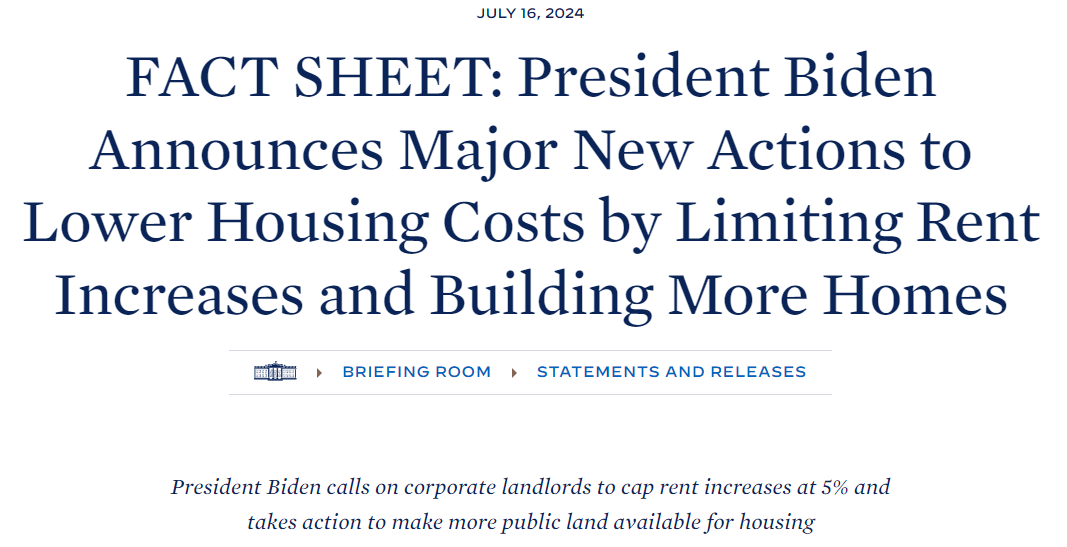The Biden Administration has continued their onslaught of the Real Estate sector. Starting with Real Estate Agent commissions all the way to Online Screening Companies. They've have announced their biggest change to-date: nation wide rent control.
On Monday (July 15, 2024), the White House Administration publicly stated that they've proposed a bill to Congress that would enact a 5% rent increase cap across the nation for corporate landlords.
This was slipped into a barrage of other housing related projections, such as a Renter's Bill of Rights (I'll save that breakdown for another time). The President stated he wants to "crack down on unfair practices that are driving up rental costs." The leading solution be to simply cap the amount a landlord can increase on an existing resident.
He gave those pesky corporate landlords the ultimatum of cap rent increases at 5% or forgo all tax benefits of owning real estate. Seems like a tough decision that will leave landlords ever wondering, "Oh what shall I do." This appears to be the perfect way to coerce landlords - leaving no beneficial options whatsoever.
But wait a second... What exactly is a "corporate" landlord?
The White House Administration defines a "corporate landlord" as an individual or entity that owns over 50 units. This could be 50 single family homes or one 50-unit apartment complex. This seems like quite the challenge to monitor in the world of LLC's and other legal entities. How do you keep of who has interest in which legal entity? Then, how many entities is that individual benefitting from?
This will apply to everyone - one way or another. There will be a major downstream affect if it passes, because these "corporate landlords" make up 50% of the rental supply in the market. Whether it be a major increase of inventory or a large increase in rent amounts - we will be affected.
Lastly, don't forget the saying: "If you give them an inch, they'll take a mile." I think you can foresee the following actions after this bill.
Getting back to their call to action... It was reinforced with the claim that "some corporate landlords have taken advantage of the shortage of available units by raising rents by more than increases in their own costs." If you took 10 minutes of an Econ 101 course, you'd realize the holes in this statement.
The saying "supply and demand" is ringing quite loudly.
There aren't enough desired homes for residents to live in (low supply), then there will be a certain price point at which renters would be willing to rent at (demand).
If a home is priced too high, then people will vote with their dollars. In the rental market, there is one way people vote with their dollars: they move. By either not renewing their lease and moving out of the market. Or, not renewing their lease and moving within' the current market.
It is the consumer who decides whether or not they are "being taken advantage of." If they deem it so, then they'll move to a more desirable home.
However, it is also the consumer who will be hurt by this policy. As with everything in the market - it'll get passed down to the consumer. Rent control is no exception. If you are a student of history, you are well aware of how price fixing has a terrible impact on the supply of the goods as well as the quality of the goods.
As the late Charlie Munger famously said, "Show me the incentive, and I'll show you the outcome."
In the case of rent control, the incentivizing structure is backed by two things: the income you receive every month (rent) and the tax savings you receive at the end of each year (depreciation). The policy proposed by the White House has jeopardized both of those incentives. As the property owner, you're left to choose which pill you'd like to swallow. Or, you may choose the unspoken option: exit the rental business.
If this rent control goes through, it is likely we see a large decrease of available houses on the rental market as owners sell off their portfolio. Thus, cutting the supply side of our equation, which in turn will... Ding..ding..ding! Increase demand for existing rentals, resulting in rent amounts climbing.
This has the potential to provide a major disservice to existing residents. If rent amounts begin to rapidly climb (along with all other costs), then the current landlords won't be willing to provide any upkeep to the home. Causing the resident to look elsewhere or live in an environment barely suitable for a person.
This is where we see the quality of the existing product deteriorate. Either the resident moves, and the landlord can hike the new rent amount to market standard. Or, let the walls collapse around the existing resident, because its too expensive to maintain due to the rapid climb in costs.
Everything is on a continuum. Whether it be no government intervention in rent pricing (Jacksonville, Florida) or extreme rent manipulation (San Francisco, CA) - which was enacted back on June 12, 1979. So, you have to imagine which environment you'd want to begin building today. In my opinion, the extreme polarities of San Fran is not something I believe the United States of America should be moving towards. This doesn't appear to be the healthiest, most sustainable solution.
Regardless of what I think, you have to be aware of what's happening in Washington DC. Every action the White House Administration takes will have an effect on both owners and residents. Whether positive or negative will be for the market to decide. However, there will always be opportunity wherever change is introduced.
Sources:
White House Press Release Fact Sheet
White House Press Call Briefing
Press Release from House Budget Committee, Chairman Arrington
Dr. Peter St. Onge on Recent Biden Announcement


